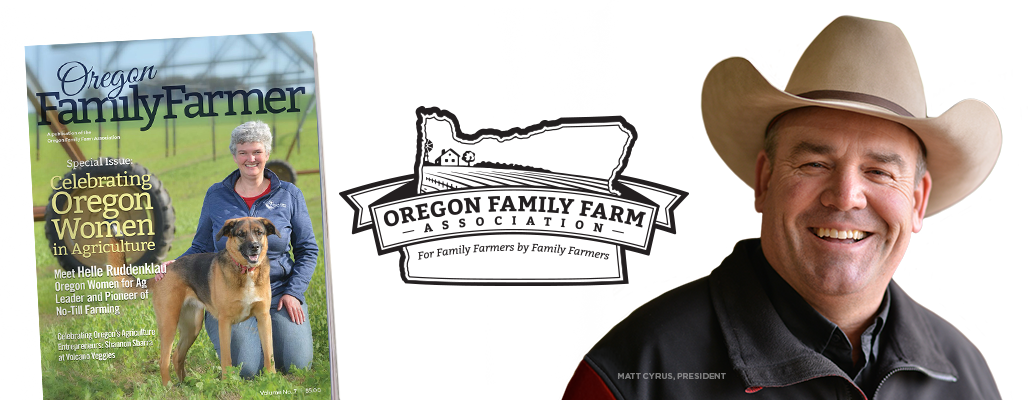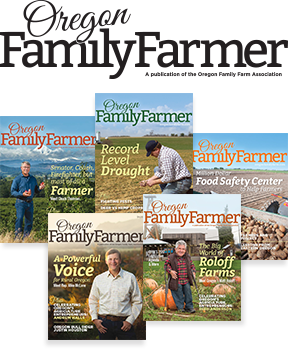Pay Attention to Your Co-Op
WORDS : ERIC FRUITS , PH.D.
Eric Fruits, Ph.D. is chief economist and president at Economics International Corp. and an adjunct professor at Portland State University.
Farmland Industries was once the largest farmer-owned co-op in the United States. In 2001, it opened a new headquarters in Kansas City. The glass-wrapped building and deluxe executive suites told the world that Farmland had become an agribusiness giant. At the time, the co-op was racking up debt—building a big expensive fertilizer plant, upgrading older fertilizer plants, and spending nearly $100 million on new computer software. In 2002, Farmland filed for bankruptcy. By 2004, its last big asset had been sold off.
Closer to home, in 2011, Pendleton Grain Growers opened a large grain storage facility at the Port of Umatilla. However, audits revealed that during this period the co-op had actually overstated its earnings by $1.8 million in 2010 and $5.7 million in 2011.
In 2012 the U.S. Department of Agriculture suspended PGG’s warehouse license for 44 days, citing inventory audit discrepancies. While PGG eked out a profit of $434,681 in 2012, financial statements show the co-op lost approximately $4.4 million in 2013 and $7.9 million in 2014. In 2016, the co-op’s members voted to dissolve PGG after 86 years in business. The co-op’s 1,850 members will have to wait years to see any dividends from the sale of PGG’s assets, if any. Two years later, PGG is still in the process of selling off its assets.
Agricultural co-ops are owned by farmer-members. Members elect a board of directors. The board sets the overall operating policies, approves the annual budget, and oversees professional management.
Professional management implements policies established by the board and handles day to day operations. The co-op’s profits—also known as “economic benefits”—are to be distributed to members based on the member’s use of the cooperative.
As co-owners, members share in the costs of operating the business, as well as the costs associated with expansion and unforeseen emergencies. Pendleton Grain Growers’ failure was due in large part to the board’s inability to adequately oversee the management team who overstated earnings. While PGG racked up losses, neighboring co-ops were earning profits and making patronage and equity payments to their members.
Marketing and supply cooperatives are the most common types of agricultural cooperatives in the United States. Marketing cooperatives assemble, pack, process, and sell members’ products in both domestic and foreign markets. Supply cooperatives purchase products and services for their members. By making large-scale purchases of fuel, seed, fertilizers, and pest control products, members expect to obtain lower prices for their inputs. Farmland Industries was hit hard by losses in its fertilizer business. In the midst of building its extravagant headquarters, the price of natural gas, an important raw material in fertilizer, began soaring. By 2002, the co-op faced a loss of $50 million of their members’ equity.
Remember the infomercial for the Ronco rotisserie? That’s the ad that said, over and over: “Set it and forget it!” Set it and forget it may be an okay strategy for roasting a chicken, but it’s a terrible strategy for the business you own. PGG, Farmland Industries, and other failed coops provide valuable lessons to Oregon farmers considering co-op membership/ownership. That lesson is pay attention: pay attention to the board; pay attention to management, pay attention to financials.
Pay Attention to the Board
A co-op’s board is democratically elected by co-op members. When it’s time to elect a board, pay attention to who is running. Remember, the board sets the co-ops overall operating policies, approves the annual budget, and oversees management of your business. Selecting the most popular or least controversial person is not the wisest choice for this job. Members need to study carefully the strengths and weaknesses of the co-op and determine how the leadership skills of the candidates address them. It’s tempting to vote for the candidate who paints a rosy picture. That person may be a great candidate. But he or she may also need the balance of another board member who is skeptical of overly optimistic forecasts or overly aggressive capital spending. One question to ask yourself is: would you let the board members run your farm?
Once the board is elected, members like you can’t just “set it and forget it” about the board. You need to keep in contact with the directors to ask questions, make comments, and request changes or new services. You also need to observe and evaluate how directors perform. Are directors watching the management, or are they just cheerleaders for the CEO? Are directors making wise investments? Are they looking out for members’ best interests? Did Farmland need a flashy new corporate headquarters while its fertilizer business was flailing? Did PGG need a new grain storage facility while its business was doing worse than reported?
Pay Attention to Management
In a co-op, the board of directors decides what the cooperative will do. The management decides how it will be done. Under ideal conditions, the general manager’s principal tasks are planning, reporting to the board of directors, and controlling the co-operative’s operations.
Bookkeeping and preparing financial reports are key pieces of management’s job. In many cases, the compensation of senior management is tied to the financial performance of the co-op. On the one hand, tying the pay of management to the performance of the co-op helps ensure that managers are acting on members’ best interest. On the other hand, it creates a temptation for managers to take unnecessary risks or—in documented cases— act unethically. Co-op members and their elected board must pay attention to management to make sure management is running the co-op to benefit members first.
In 2011, A federal judge sentenced the former CEO of California’s Humboldt Creamery to prison and ordered him to pay $7 million for falsifying financial records for a loan from CoBank ACB. The CEO inflated the company’s inventory and accounts receivable from 2005 through 2008, which ultimately led it to default on a loan from CoBank, bankrupting the company. The company was 75 percent owned by a cooperative of local dairy farmers.
In 2012, Diamond Foods, who had just converted from a walnut grower cooperative, faced allegations of fraud. An investigation into the company’s accounting resulted in a restatement of earnings wiping out $56.5 million in profits over two years. In 2014, Diamond Foods, and its former CEO, paid $5 million to settle fraud charges with the Securities and Exchange Commission (SEC) over the scheme.
Pay Attention to Financials
Most co-op members pay attention to only one financial statement: the annual statement showing the patronage refund. Many co-ops pay part of their net income (or net margin)—usually 20 percent—in cash to their members and retain the remaining funds for future capital needs. These retains are allocated to each member’s account, although some co-ops also keep a portion of the net income as unallocated reserves. Tax laws require that co-ops notify each member in writing of their patronage refunds and the total amount allocated to the members account. Pay attention to this statement. Co-op accounting is very complex and difficult for many members to understand. Co-op members have a right to look at the group’s annual reports. Pay attention to those annual reports. Look for red flags, look for big changes, look for accounting terms that are unfamiliar or hard to understand. One big red flag is a change in accounting practices. Look for changes in how revenues and inventory are calculated (year to year). In Minnesota this year, the Ashby Farmers’ Cooperative Elevator closed for business in the wake of fraud by its long-time manager, including false claims that the co-op had $4 million worth of grain in off-site storage. Do a sniff test. If you feel like it was “bad year” for your crop, is that showing up in the financials? Do you see unexplained changes in inventory, write-offs or adjustments? Or do the financials make things look better than you think they should? A red flag doesn’t necessarily mean something’s wrong or someone’s cheating, it does mean you should ask key questions.
Co-ops provide many benefits to their members. However, membership in a co-op should not be treated as a “set it and forget it” proposition. Instead, take the approach of “trust, but verify”— or smarter still — “don’t trust and verify.” Members must pay attention to who runs their co-op, how they run it, and what is being reported. When you are a member of a cooperative, you are also an owner with every right to know the whole truth — including the good and the bad. The most effective coops succeed when owner-members pay careful attention to the board, the management and the financials for their organization.


